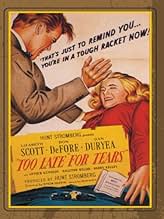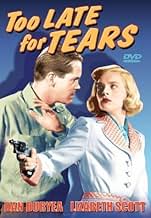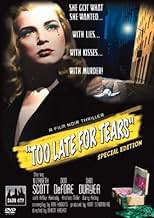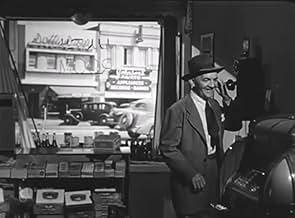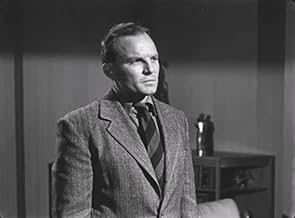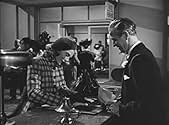IMDb रेटिंग
7.3/10
6.3 हज़ार
आपकी रेटिंग
अपनी भाषा में प्लॉट जोड़ेंThrough a fluke circumstance, a ruthless woman stumbles across a suitcase filled with $60,000, and is determined to hold onto it even if it means murder.Through a fluke circumstance, a ruthless woman stumbles across a suitcase filled with $60,000, and is determined to hold onto it even if it means murder.Through a fluke circumstance, a ruthless woman stumbles across a suitcase filled with $60,000, and is determined to hold onto it even if it means murder.
- पुरस्कार
- कुल 2 जीत
Jimmy Ames
- Fat Man
- (बिना क्रेडिट के)
Georgia Backus
- Woman
- (बिना क्रेडिट के)
Robert Bice
- Policeman
- (बिना क्रेडिट के)
Paul Bradley
- Hotel Clerk
- (बिना क्रेडिट के)
John Butler
- Little Man Answering Phone
- (बिना क्रेडिट के)
David Clarke
- Jack Sharber
- (बिना क्रेडिट के)
Jimmie Dodd
- Second Car Thief
- (बिना क्रेडिट के)
Renee Donatt
- Young Lover in Boat
- (बिना क्रेडिट के)
Charles Flynn
- Policeman
- (बिना क्रेडिट के)
Billy Halop
- Boat Attendant
- (बिना क्रेडिट के)
Richard Irving
- First Car Thief
- (बिना क्रेडिट के)
Perry Ivins
- Checkroom Attendant
- (बिना क्रेडिट के)
फ़ीचर्ड समीक्षाएं
Lizabeth Scott did her best remembered work in film noir (more than half of her only 21 screen credits fall within the noir cycle), and became one of its iconic faces. Rarely, however, was she called upon to play the fully-fledged femme fatale, and there's probably a reason for this: She couldn't bring off duplicity.
Her smile had no shadings into wry, or ironic, or smirky; it had but one setting a fresh, guileless grin that lit up like a Christmas tree. F. Scott Fitzgerald (in his sad screenwriting days) observed of Joan Crawford that you couldn't give her a simple stage direction like `telling a lie' because then she'd give an impersonation of Benedict Arnold betraying West Point to the British. But Scott can't manage even that, which results in confusingly mixed signals when her characters are motivated by malice, like Coral Chandler in Dead Reckoning: Her smile keeps convincing us that she's on the up-and-up.
Her damn smile keeps switching on in Too Late For Tears, even though there's no doubt that she's one hard, cold case. She and husband Arthur Kennedy are bickering one night en route to a party in the Hollywood Hills when suddenly a suitcase crammed with cash lands in their roadster. He wants to turn it over to the police, but she persuades him to think it over, so they check the valise at Union Station. When she starts buying clothes and furs against the checked capital, it's clear she has no intention of surrendering the windfall; we learn that her background was `white-collar poor, middle-class poor,' and that she'd made a previous marriage solely for money.
Strange men start ringing her doorbell. First Dan Duryea shows up, a blackmailer for whom the payoff was intended. He slaps her around playfully (`What do they call you besides stupid,' she taunts him. `Stupid will do if you don't bruise easily,' he purrs back). Quickly Scott maneuvers Duryea into helping him murder Kennedy but still won't tell him where the money's stashed. Though wary, he falls for her, starts hitting the bottle, and grows careless. Meanwhile, Kennedy's sister (Kristine Miller) harbors suspicions about his mysterious disappearance. When the next caller (Don DeFore) shows up, claiming to be an old Air Corps buddy of Kennedy's, she makes an alliance with him to find out what's really going on. And the claim ticket for the money keeps changing hands....
The plot is none too simple, and in consequence director Byron Haskin spends a lot of time trying to keep it clear rather than addressing some questions about character and logic that inevitably arise. Why did the avaricious, manipulative Scott marry Kennedy in the first (or second) place? Why does the sister live so conveniently close? How did Duryea, and for that matter DeFore, find Scott so easily? But few thriller plots are so tightly constructed that they survive rigorous analysis. Too Late For Tears passes muster as hard-boiled, late-40s noir and as one of Scott's hardest, strongest performances, inappropriate smile and all.
Her smile had no shadings into wry, or ironic, or smirky; it had but one setting a fresh, guileless grin that lit up like a Christmas tree. F. Scott Fitzgerald (in his sad screenwriting days) observed of Joan Crawford that you couldn't give her a simple stage direction like `telling a lie' because then she'd give an impersonation of Benedict Arnold betraying West Point to the British. But Scott can't manage even that, which results in confusingly mixed signals when her characters are motivated by malice, like Coral Chandler in Dead Reckoning: Her smile keeps convincing us that she's on the up-and-up.
Her damn smile keeps switching on in Too Late For Tears, even though there's no doubt that she's one hard, cold case. She and husband Arthur Kennedy are bickering one night en route to a party in the Hollywood Hills when suddenly a suitcase crammed with cash lands in their roadster. He wants to turn it over to the police, but she persuades him to think it over, so they check the valise at Union Station. When she starts buying clothes and furs against the checked capital, it's clear she has no intention of surrendering the windfall; we learn that her background was `white-collar poor, middle-class poor,' and that she'd made a previous marriage solely for money.
Strange men start ringing her doorbell. First Dan Duryea shows up, a blackmailer for whom the payoff was intended. He slaps her around playfully (`What do they call you besides stupid,' she taunts him. `Stupid will do if you don't bruise easily,' he purrs back). Quickly Scott maneuvers Duryea into helping him murder Kennedy but still won't tell him where the money's stashed. Though wary, he falls for her, starts hitting the bottle, and grows careless. Meanwhile, Kennedy's sister (Kristine Miller) harbors suspicions about his mysterious disappearance. When the next caller (Don DeFore) shows up, claiming to be an old Air Corps buddy of Kennedy's, she makes an alliance with him to find out what's really going on. And the claim ticket for the money keeps changing hands....
The plot is none too simple, and in consequence director Byron Haskin spends a lot of time trying to keep it clear rather than addressing some questions about character and logic that inevitably arise. Why did the avaricious, manipulative Scott marry Kennedy in the first (or second) place? Why does the sister live so conveniently close? How did Duryea, and for that matter DeFore, find Scott so easily? But few thriller plots are so tightly constructed that they survive rigorous analysis. Too Late For Tears passes muster as hard-boiled, late-40s noir and as one of Scott's hardest, strongest performances, inappropriate smile and all.
Jane and Alan Palmer accidently receive a satchel containing sixty thousand dollars that was intended as a blackmail payoff. Alan wants to turn the money over to the police, but money loving Jane wants to keep it. Meanwhile the blackmailer confronts Jane about his absconded payment. Greedy Jane murders her husband and then pretends to make a deal with the blackmailer. However, a ghost from Janes past returns to be her undoing.
Considering that Byron (WAR OF THE WORLDS) Haskin was never a really good director of actors, this film is very well acted. The cast turns in first rate performances, so good in fact that the performers almost make the viewer not notice that this film has a very far fetched, convoluted plot.
I have seen a lot of these "film noirs" and of all of them, TOO LATE FOR TEARS is probably one of the most cynical. Few other films I have seen have this thick air fatalism hanging over it.
Kristine Miller who plays Alan's sister Kathy, is one of the most beautiful women to grace the screen. This the first time I noticed her, and it's a shame her film career was rather short, and rarely had large roles as she had here.
One note: If you pay close attention, you will see former "Dead End" Kid leader Billy Halop in small role as a boat attendant.
Considering that Byron (WAR OF THE WORLDS) Haskin was never a really good director of actors, this film is very well acted. The cast turns in first rate performances, so good in fact that the performers almost make the viewer not notice that this film has a very far fetched, convoluted plot.
I have seen a lot of these "film noirs" and of all of them, TOO LATE FOR TEARS is probably one of the most cynical. Few other films I have seen have this thick air fatalism hanging over it.
Kristine Miller who plays Alan's sister Kathy, is one of the most beautiful women to grace the screen. This the first time I noticed her, and it's a shame her film career was rather short, and rarely had large roles as she had here.
One note: If you pay close attention, you will see former "Dead End" Kid leader Billy Halop in small role as a boat attendant.
No need to recap the convoluted plot. The movie's a sleeper among noirs, thanks mainly to an unpredictable and well thought-out screenplay from writer Huggins. Just when you think you've got things figured, you don't. I especially like the way Huggins subtly reverses Jane's (Scott) and Danny's (Duryea) competitive relationship. Watching the two circle each other is like watching two hungry sharks. Apparently, they want to mate but don't dare get too close. Note too, how effectively director Haskin uses the stylish wide-brimmed hats to veil the identity of men entering a room. I don't recall this clever effect in any other film. This is also one of the few noirs to make the central character a woman (Jane) instead of a man.
Then too, it's a very well cast movie. Duryea is of course Duryea, a major icon of noir. On the other hand, Scott was always more a presence than an actress. Still, her presence here is used to good effect as a greedy spider woman, even if she doesn't achieve much depth. But I especially like the underrated Don DeFore. His trademark nice guy is also used to good effect in what turns out to be something more than just a nice guy. (Be sure to catch ex-Dead End kid Billy Halop as the cranky boat manager.)
I guess the only missing element from classic noir are the angular shadows of moral ambivalence. Haskin does film a number of night scenes, but I don't spot the classic lighting. Perhaps that's because his specialty as a director was science fiction and adventure films. Anyway, I'm not sure why this withering little drama hasn't achieved more recognition. Maybe it's because it was an independent production without studio backing. But whatever the reason, the movie remains a gritty little noir worth catching up with.
Then too, it's a very well cast movie. Duryea is of course Duryea, a major icon of noir. On the other hand, Scott was always more a presence than an actress. Still, her presence here is used to good effect as a greedy spider woman, even if she doesn't achieve much depth. But I especially like the underrated Don DeFore. His trademark nice guy is also used to good effect in what turns out to be something more than just a nice guy. (Be sure to catch ex-Dead End kid Billy Halop as the cranky boat manager.)
I guess the only missing element from classic noir are the angular shadows of moral ambivalence. Haskin does film a number of night scenes, but I don't spot the classic lighting. Perhaps that's because his specialty as a director was science fiction and adventure films. Anyway, I'm not sure why this withering little drama hasn't achieved more recognition. Maybe it's because it was an independent production without studio backing. But whatever the reason, the movie remains a gritty little noir worth catching up with.
My 6th Noir in a self-managed study of Noir.
The web of deceit weaved by this crazy blond is a marvel to behold. Her brazen disregard for common sense, and the way she controls people around her, make her quite hate-worthy, which would make the actress Lizabeth Scott pleased to know.
Kristine Miller stole my heart with her grace and femininity as the innocent in-law, trying to make sense of the mad house of characters dropping in and out of her brother's apartment.
The toxic, manipulative love/hate relationship portrayed by Dan Duryea and Lizabeth Scott radiated sparks of electricity. See if *you* can figure out where that thing is headed. Only one of them can get the upper hand in this caper.
As I watched the version on Archive.org, I found myself wondering, "How are they going to wrap this up with only a few minutes to go?" knowing the clock is running out only heightens the tension of this nifty Noir.
Why aren't more people suspicious around such toxic characters? Maybe we all dread looking behind that curtain. Classic tragedy speaks to this.
This is some excellent story-telling, and is highly recommended.
The web of deceit weaved by this crazy blond is a marvel to behold. Her brazen disregard for common sense, and the way she controls people around her, make her quite hate-worthy, which would make the actress Lizabeth Scott pleased to know.
Kristine Miller stole my heart with her grace and femininity as the innocent in-law, trying to make sense of the mad house of characters dropping in and out of her brother's apartment.
The toxic, manipulative love/hate relationship portrayed by Dan Duryea and Lizabeth Scott radiated sparks of electricity. See if *you* can figure out where that thing is headed. Only one of them can get the upper hand in this caper.
As I watched the version on Archive.org, I found myself wondering, "How are they going to wrap this up with only a few minutes to go?" knowing the clock is running out only heightens the tension of this nifty Noir.
Why aren't more people suspicious around such toxic characters? Maybe we all dread looking behind that curtain. Classic tragedy speaks to this.
This is some excellent story-telling, and is highly recommended.
Byron Haskin of Arsenic and Old Lace and War of the Worlds fame teamed up with Roy Huggins to create this solid film noir entry. Huggins writing is superb for the genre - neither pretentious nor overly manic. The pace is brisk but not painfully so. And the film is very well conceived, well directed, well edited and very well acted.
The remarkable Lizabeth Scott (Jane Palmer), married to a young Arthur Kennedy (Alan Palmer), is the focus of our attention. The coupled are driving to a friend's house when a car flashes them and its occupant tosses a leather bag with 60,000 dollars into their car and drives off. Jane wants to keep it, Alan wants to turn it in. Soon, this windfall becomes a mixed blessing, as it reveals a rather frightening side of Jane's personality. The plot intertwines noir twists and turns and incessant mystery and, frequently, winds up in unanticipated places.
Lizabeth Scott is PERFECT, and really MAKES this film as much as the intriguing story and successful directing. Don Defore also turns in a notable performance as does Kristine Miller. Dan Duryea was nicely cast in his role as the heavy, but his performance here was just a sliver below his usual par.
This is very nice bit of noir cinema and will satisfy most noir fans, as well as modern crime drama aficionados. Recommended!
The remarkable Lizabeth Scott (Jane Palmer), married to a young Arthur Kennedy (Alan Palmer), is the focus of our attention. The coupled are driving to a friend's house when a car flashes them and its occupant tosses a leather bag with 60,000 dollars into their car and drives off. Jane wants to keep it, Alan wants to turn it in. Soon, this windfall becomes a mixed blessing, as it reveals a rather frightening side of Jane's personality. The plot intertwines noir twists and turns and incessant mystery and, frequently, winds up in unanticipated places.
Lizabeth Scott is PERFECT, and really MAKES this film as much as the intriguing story and successful directing. Don Defore also turns in a notable performance as does Kristine Miller. Dan Duryea was nicely cast in his role as the heavy, but his performance here was just a sliver below his usual par.
This is very nice bit of noir cinema and will satisfy most noir fans, as well as modern crime drama aficionados. Recommended!
क्या आपको पता है
- ट्रिवियाThe UCLA Film and Television Archive has remastered Too Late for Tears (1949) from a recently discovered original print. The restoration process took five years after the print was discovered in France, and involved piecing segments of another copy into the restored version to have a complete film. The restoration was funded by the Film Noir Foundation. The restored version was broadcast on 7/17/2015, on the Turner Classic Movies network in pristine condition. The restored version of the film was released in 2016 on Blu-ray in the United States and the United Kingdom. The film has developed a cult following in the years since its release.
- गूफ़Jane tells Alan that the $790 she has spent represents about one tenth of a percent of the money in the satchel. Since they thought they had $100,000 (later determined by Danny the blackmailer to be $60,000). One tenth of a percent of 100,000 would be $100, so she spent closer to eight tenths of a percent of what she thought they had. A tenth of a percent of $60,000 would be $60, and $790 would be slightly over 1.3 per cent of that amount.
- भाव
Danny Fuller: Don't ever change, Tiger. I don't think I'd like you with a heart.
- कनेक्शनEdited into Your Afternoon Movie: Too Late for Tears (2022)
टॉप पसंद
रेटिंग देने के लिए साइन-इन करें और वैयक्तिकृत सुझावों के लिए वॉचलिस्ट करें
- How long is Too Late for Tears?Alexa द्वारा संचालित
विवरण
- चलने की अवधि
- 1 घं 39 मि(99 min)
- रंग
- पक्ष अनुपात
- 1.37 : 1
इस पेज में योगदान दें
किसी बदलाव का सुझाव दें या अनुपलब्ध कॉन्टेंट जोड़ें


